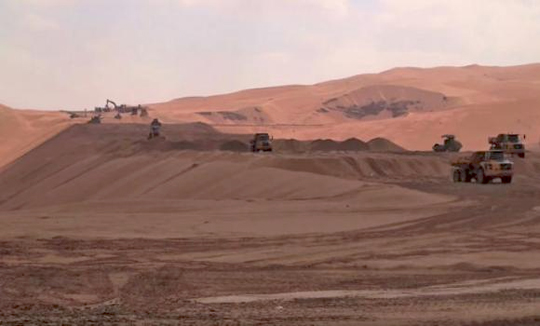Riyadh, Oct 9: Saudi Arabia and Oman have completed the construction of a mega road project linking the two countries.
“The new road, which will cut the distance between Saudi Arabia and Oman by about 800 km, will be opened soon for public,” said Ahmad Hilal Al-Busaidi, Omani ambassador, Wednesday.
Al-Busaidi said the two countries were currently building the administrative infrastructures including immigration posts and check points across the two ends of the road. “This has delayed the inauguration of the road project,” said the diplomat, adding that this will be first overland direct link between the two countries.
Oman and Saudi Arabia are currently linked via road through the UAE, spanning a total distance of 2,000 km. He said that travelers shuttling between Saudi Arabia and Oman would no longer need to cross the UAE.
The Kingdom has spent about SR1.6 billion on the motorway that passes through the eastern Saudi province of Al-Ahsa and the Rub' al-Khali desert (Empty Quarter) ending at Oman border.
The road inside Oman is around 160 km long, starting from Tanam in Ibri province, passing through oilfields until it reaches the Oman-Saudi border in the Empty Quarter.
“The road has a direct access to south Oman,” said the diplomat.
Inside Saudi Arabia, the road is 519-km long, including a 247-km stretch from the Omani border to Shaybah and the 319-km stretch from Shaybah to the Batha-Haradh road, which leads to Al-Kharj and then to Riyadh.
Al-Rosan Contracting, which had been commissioned to build 256 km of the road on the Saudi side, said the project had been a big challenge because the road is constructed through shifting sands across the Rub’ al Khali Desert, the largest and most barren sand desert in the world covering 600,000 square kilometers.
“Trying to build a road on shifting sand dunes was always going to be difficult. The project involved building sand bridges across salt flats and high rising dunes, so the selection of adaptable and reliable equipment was critical for this project, not least because of the aggressive environment, intense heat, sand and remoteness of the site,” an Al-Rosan manager was quoted as saying in a statement by Volvoce.com.
The statement said FAMCO (Al-Futtaim Auto & Machinery Co. LLC) is the equipment contracting partner of Al-Rosan in the project and it has used 95 Volvo machines, including a range of articulated haulers, excavators and motor graders, through the several stages of the project.
“The construction of the 256 km road was completed in sections and involved gigantic amounts of sand ‘cut and fill’. The sand transported to construct the bridge was 130 million m3 — the equivalent of 26 giant pyramids — and 12 million m3 of material was needed to protect the embankment of sand from wind and water,” it said.
Spelling out the features of this project, Al-Busaidi said: “The opening of the road will create trade and investment opportunities besides boosting tourism between the two countries.”
This new road project will also help vehicles including trailers laden with goods to reach fast to their destinations in the Kingdom or in Oman, he added.
He said that Oman, being a GCC member, seeks to promote relations with the Kingdom in all sectors. The new project will help the Kingdom to be well connected with the strategic cities and towns in Oman, which also shares borders with the UAE and Yemen as well as marine borders with Iran and Pakistan.






Comments
Add new comment